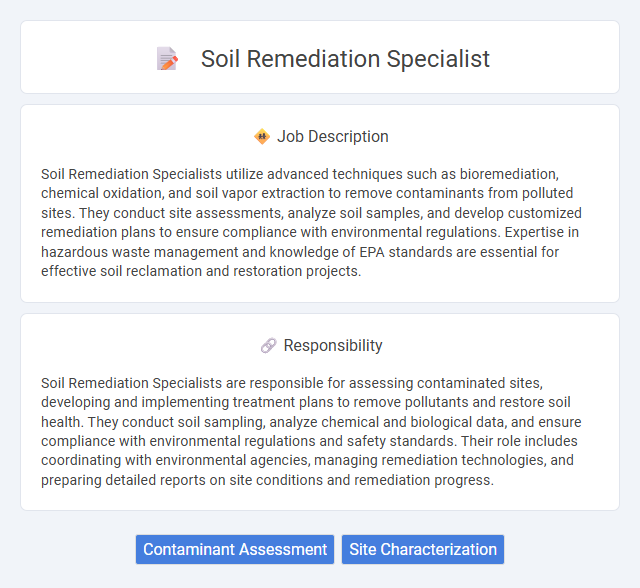
Soil Remediation Specialists utilize advanced techniques such as bioremediation, chemical oxidation, and soil vapor extraction to remove contaminants from polluted sites. They conduct site assessments, analyze soil samples, and develop customized remediation plans to ensure compliance with environmental regulations. Expertise in hazardous waste management and knowledge of EPA standards are essential for effective soil reclamation and restoration projects.
Individuals with a strong interest in environmental science and hands-on fieldwork will likely find the Soil Remediation Specialist role suitable. Those who can manage physically demanding tasks and tolerate outdoor conditions might thrive in this position. People with patience for detailed analysis and problem-solving in contaminated soil scenarios probably suit the job well.
Qualification
A Soil Remediation Specialist must possess a strong background in environmental science, chemistry, or geology, often requiring a bachelor's or master's degree in these fields. Proficiency in soil sampling techniques, contamination assessment, and remediation technologies such as bioremediation, soil vapor extraction, and chemical oxidation is essential. Certifications like OSHA HAZWOPER and experience with regulatory compliance (EPA standards) enhance the specialist's qualifications and effectiveness in managing contaminated sites.
Responsibility
Soil Remediation Specialists are responsible for assessing contaminated sites, developing and implementing treatment plans to remove pollutants and restore soil health. They conduct soil sampling, analyze chemical and biological data, and ensure compliance with environmental regulations and safety standards. Their role includes coordinating with environmental agencies, managing remediation technologies, and preparing detailed reports on site conditions and remediation progress.
Benefit
Soil remediation specialists likely improve environmental health by effectively removing contaminants from soil, reducing risks to human health and ecosystems. Their expertise probably enhances land usability, allowing for safer agricultural or construction activities. Employment in this field may offer strong job stability due to increasing demand for environmental cleanup and regulatory compliance.
Challenge
Soil remediation specialists often face the challenge of accurately identifying and assessing diverse contaminants within complex soil environments, which requires advanced analytical techniques and expertise. The probability of encountering unpredictable site conditions demands adaptive problem-solving skills and innovative remediation strategies. Limited regulatory frameworks and budget constraints can further complicate effective cleanup efforts.
Career Advancement
Soil Remediation Specialists play a crucial role in environmental cleanup by assessing and implementing strategies to remove contaminants from soil, ensuring compliance with regulatory standards. Career advancement in this field often involves gaining certifications such as the Certified Environmental Scientist (CES) or Professional Geologist (PG), which open opportunities for senior project management or consultancy roles. Mastery in emerging remediation technologies and expertise in environmental regulations enhances prospects for leadership positions within environmental firms or government agencies.
Key Terms
Contaminant Assessment
Soil remediation specialists conduct detailed contaminant assessments to identify hazardous substances such as heavy metals, petroleum hydrocarbons, and pesticides within soil environments. Utilizing advanced techniques like gas chromatography, mass spectrometry, and soil sampling, they quantify pollutant concentrations to evaluate contamination severity. Accurate contaminant assessment guides the development of effective remediation strategies, ensuring compliance with environmental regulations and promoting ecosystem restoration.
Site Characterization
Soil Remediation Specialists conduct detailed site characterization to assess contamination levels and identify pollutants in soil and groundwater. They utilize techniques such as sampling, chemical analysis, and geophysical surveys to map contamination extent and determine remediation strategies. Accurate site characterization is critical for developing effective soil cleanup plans and ensuring compliance with environmental regulations.
 kuljobs.com
kuljobs.com